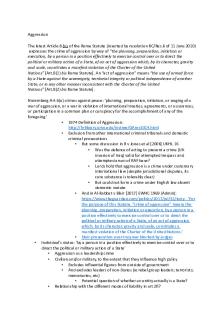International LAW PDF

| Title | International LAW |
|---|---|
| Author | Siphesihle Shange |
| Course | International law |
| Institution | University of KwaZulu-Natal |
| Pages | 9 |
| File Size | 400.5 KB |
| File Type | |
| Total Downloads | 62 |
| Total Views | 173 |
Summary
Download International LAW PDF
Description
INTERNATIONAL LAW 2020 COURSE OUTLINE
1. INTRODUCTION The scope of International Law is vast: it shapes the present international legal, political and economic order, and increasingly plays a constitutive role in our daily, ‘local’ lives. In a South African context, the Constitutional Court has noted that the “provisions of our Constitution demonstrate that international law has a special place in our law which is carefully defined by the Constitution” (Glenister v President of the Republic of South Africa and Others). As such, it is important for us as students (and subjects) of the law to have a good understanding of International Law. With this in mind, the aims of this module include: (1) to offer a critical introduction to the discipline of International Law and its history (with a focus on its colonial origins); (2) to introduce students to the main principles and substantive elements of the international legal system; (3) to offer a general introduction to the various subject areas within the discipline and (4) to stimulate interest in the further study of specific areas of International Law. In order to do so, the course is divided into four sections: the (i) Decolonising the histories & Theories , (ii) Subjects, (iii) Principles and (iv) Projects of International Law. The Decolonising the Histories & Theories section asks what is the nature and purpose of international law, and how has this changed over time? Traditionally, International Law has been taught as a formal system of rules that aim to create order amongst states , and more recently protect individuals from states. However, in recent times critical scholars have drawn links, both past and present, between international law, colonialism and imperialism. This section will consider these competing historical and theoretical accounts of the nature of international law, and discuss how we might situate colonial-apartheid South Africa within them.
The Subjects section will consider three ‘actors’ in the international legal system: States, International Institutions and individuals. First, it will consider how States – the primary ‘subjects’ of international law – come into ‘existence’, and the competing theoretical understandings of ‘statehood’. Second, it will consider how over the past century international institutions – like the United Nations and the World Trade Organisation– have also come to enjoy ‘international legal personality’ and what this entails. Finally, it will briefly consider the rise of the individual in international law, as bearers of rights and obligations, as well as ‘experts’ and technocrats. The Principles section will consider three governing principles of international law. First it will consider Sovereignty, in both its external dimensions (i.e. Equality amongst states) and the internal dimensions (i.e. jurisdiction over territory). Second, it will discuss the prohibition on the use of force by states, which is subject to several, contentious exceptions. Third, and related to this, it will consider the principle is that states should settle disputes peacefully through, inter alia, negotiation, arbitration and judicial settlement before the International Court of Justice (ICJ). The Projects section will conclude the course by considering three contemporary projects of international law (and international lawyers) that aim to improve the lives of individuals by (i) international humanitarian law, (ii) ending ‘impunity’ for international crimes (i.e. war crimes, crimes against humanity and genocide) and (iii) protecting and promoting human rights through corporate social responsibility. This section will consider both the histories and successes of these sub-fields of international law (i.e. international humanitarian law, international criminal law and international trade law), as well as the critiques that situate them within international law’s ongoing colonial legacy. In doing so it will return to the questions that animate the first section: What is the nature and purpose of international law, and how has this changed over time? 2. ADMINISTRATION The Lecturers for this course are Prof Shannon Bosch (office 116, Suite B, Howard College: [email protected]), Mr Christopher Gevers (Office 130, Suite D, Howard College: [email protected]) and Ms Clydenia Stevens (Office 29, Suite H, Howard College : [email protected]). The course Administrator is Mrs Murugan (Suite I, Howard College: [email protected]) . The ‘Moodle’ platform will be the primary vehicle for communicating with students outside the classroom. Please go to https://moodle.ukzn.ac.za/ , login using your UKZN login and familiarise yourself with this platform. The course materials and updates will be posted on Moodle. You are advised to check your Moodle profile regularly in order to keep updated with the course developments. Communications will also be sent to students via email, when necessary. Please ensure that you check your university email regularly. No communication will be entered into with students via private email addresses (i.e. yahoo, gmail, etc). 3. COURSE FORMAT 3.1 Blended Learning This course adopts a blended learning approach, which involves combining ‘contact hours [i.e. lectures] carefully fused with (and not replaced by) educational technologies, thus capitalizing on the strength of both face-to-face and online engagement’. Lectures The course will primarily be taught through lectures, attendance at lectures is compulsory and students are expected to come to class fully prepared to participate meaningfully in class discussions. For each topic students will be required to read a text (a Book Chapter, an Article, etc) prior to the lecture. These readings are listed in the Lecture Schedule and, with the exception of textbooks excerpts, will be placed on moodle.ukzn.ac.za.. Following the lecture students will be provided with a lecture outline which will summarise the issues & set the learning outcomes, these will be placed on moodle.ukzn.ac.za. Students are expected to explore the prescribed readings and outlines, along with other cases, documents & relevant websites to further their understanding and compile their own set of notes. 2
Online Materials For each of the topics covered there will be webinars, podcasts and other materials placed on moodle in order to complement - not replace - the class lectures. These materials and exercises are designed to improve students’ understanding of the topics and texts discussed in class, and students are encouraged to take advantage of them (before class where possible).
3.2 General Readings on International Law In addition to the prescribed materials, students are advised to consult the following General Texts on International Law (available in the Library): 1. 2. 3. 4. 5.
Dugard, J et al (2018). Dugard’s International Law – A South African Perspective, 5 ed. Strydom, H et al (2015), International law, OUP Southern Africa. Brownlie, I (2008). Principles of Public International Law, 7 ed. Cassese, A (2005) International law, 2 ed. Shaw, M (2008) International Law 6 ed.
4. CLASS SCHEDULE1
WEEK
TOPIC
READINGS
ONLINE CONTENT
DECOLONISING THE HISTORIES AND THEORIES OF INTERNATIONAL LAW WEEK 1 (3 - 7 FEB) GEVERS
Dugard, International Law, 2 What is International pp. 1-7 Law? Matua, ‘What is TWAIL?’, pp. 31-35. Histories of Dugard, International Law, International Law pp. 9-14 & OUP
Anghie, ‘Short Introduction’ (see moodle.ukzn.ac.za). Pinto, ‘Evolution of International Law’ (Video) History of International Law Interactive Timeline.
Anghie, ‘The Evolution of International Law: colonial and postcolonial realities’.
WEEK 2 (10 – 14 FEB) GEVERS
Histories of International Law (continued)
Grovogui, Sovereigns, Quasi Anghie, ‘International Law and History’ (Video/Audio) Sovereigns, and Africans: Race and Self-Determination in International Law (excerpts)
Dugard, International Law, South Africa and (in) pp. 15-23. the histories of Gevers, ‘South Africa, international law International Law and Decolonisation’.
WEEK 3
Approaches to
Dugard, International Law, pp. 7-9.
1 Please note that the lecture schedule may be subject to change. Students will be informed of such changes via moodle.ukzn.ac.za 2 References to Dugard, International Law are to the Fourth Edition, published in 2011. Copies are available in the Law Library. Students may also consult earlier or later editions of Dugard, however bear in mind the page numbers might change. Please email [email protected] if you have any questions. 3
International Law: (17 – 21 FEB) Positivism, TWAIL & Chimni, ‘Third World Approaches to International Black GEVERS Law: A Manifesto’ (excerpts). Internationalism
See moodle.ukzn.ac.za
Gevers, ‘”Unwhitening the world”: Re-thinking race in international law’.
4
SUBJECTS OF INTERNATIONAL LAW
WEEK 4 (24 - 28 FEB) STEVENS
States
Stevens , Statehood (excerpts) Dugard, International Law (new edition), Chapter 5 (pp. 126-164).
‘Subjects of International Law explained’ (Video)
Dugard, International law (new edition), Chapter 6 (pp. 165-170).
See Moodle for further readings on Statehood
‘Sovereignty’ by Gerry Simpson (Video)
Dugard, International Law (new edition), Chapter 7 (pp. 171-179). Dugard, International Law (new edition), Chapter 4 (pp. 57-125). Shaw, International law (8th edition), Chapter 5 and 4.
WEEK 5 (2 – 6 MAR) STEVENS
International Institutions
‘The United Nations: It’s Your Dugard, International Law, (new edition), Chapter 14 (pp. World’ (Video) 441-452) ‘WTO video debate’ Shaw, International law (8th edition), Chapter 22.
See Amerasinghe, Principles of the Institutional Law of International Organizations. See Klabbers, An Introduction to International Institutional Law.
See Moodle for further readings etc. on this topic. Shaw, International law (8th edition), Chapter 5.
WEEK 6 (9 – 13 MAR) STEVENS
Individuals
See Moodle for further readings on the position of the Individual in International law
Matua, ‘Savages, Victims, Saviors: The Metaphor of Human Rights’ (excerpts).
5
PRINCIPLES OF INTERNATIONAL LAW
WEEK 7 (16 – 20 MAR BOSCH)
Sovereign Equality
WEEK 8 (23 – 27 MAR) BOSCH)
WEEK 9 (30 March – 03 APRIL) BOSCH)
Dugard, International Law, chapter 12. See Moodle for further readings
‘Sources of International Law’ (Video)
Dugard, International Law, chapter 24.
‘United Nations Security Council’ (Video)
See Moodle for further readings
Tladi, ‘The African Union Peace and Security Architecture’ (Video/Audio)
‘Jurisdiction of States’ (Video)
The Use of Force
Dugard, International Law, chapter 22 Settlement of International Disputes See Moodle for further readings
United Nations, ‘What is the International Court of Justice’ Greenwood, ‘International Law in the Age of Adjudication’ (Video/Audio).
CLASS TEST ON FRIDAY, 3 APRIL 2020 Vacation : 04 April to 13 April 2020 ASSIGNMENT DUE: TUESDAY 14 APRIL 2020
PROJECTS OF INTERNATIONAL LAW
WEEK 10 (14 -17 APRIL) BOSCH
International Humanitarian Law
Dugard, International Law, chapter 25 See Moodle for further readings
Basic concepts and history of IHL (video)
Dugard, pp. 157-213
‘Individual Criminal Responsibility explained’ International Criminal Gevers, ‘Africa & International (Video) Law Criminal Law’. (20 APRIL – 3 MAY) GEVERS ‘The History of the International Criminal Court’ Mon 27th & Fri 1st (Public holidays) (Video) WEEK 11
WEEK 12 (4- – 8 MAY) STEVENS
Ruggie, ‘Protect, Respect and UN Global Compact (Video) International Trade Remedy: a Framework for Business and Human Rights’ The Corporation Law (Multilateral, Regional and National Documentary (Video) Stevens, Reviving the right to Frameworks) development within the WTO, trade impact (Video) multilateral trade framework affecting (African) countries to See Moodle for further actualise Agenda 2063 readings on the topic (excerpts)
6
5. GENERAL COURSE OBJECTIVES Learners should be able to: 1. Understand and reflect critically upon the contemporary debates regarding international law’s histories, nature and purpose, and its relationship to colonialism and imperialism; 2. Define, explain, understand, apply and evaluate the legal concepts, principles and rules which make up the system of international law; 3. Explain, apply and evaluate the subjects of international law and understand how the international community functions; 4. Locate, identify and extract the concepts, principles and rules of international law from a diverse range of sources; 5. Present written arguments on the concepts, principles and rules of international law so as to demonstrate an understanding of the relevant concepts, principles and rules and of the current legal debates; and 6. Analyse factual scenarios so as to identify the nature of the problem, set out the appropriate legal concepts, principles and rules and correctly apply these concepts, principles and rules so as to demonstrate an understanding of the relevant concepts, principles and rules. Learners should apply their minds to these outcomes to assess their understanding of particular topics and the course as a whole. 6. ASSESSMENTS The course will be assessed as follows: Assignment Class test Exam
20% 20% 60%
A. Assignment: 1. 2. 3.
4.
5.
The Assignment topic will be posted on moodle.ukzn.ac.za The Assignment is due on Tuesday 14 April 2020. All assignments must be submitted online (on moodle.ukzn.ac.za), without exception. Plagiarism – the act of taking and using another person’s work as one’s own – will not be tolerated. Please familiarise yourself with the universities Plagiarism Policy available at http://registrar.ukzn.ac.za/policies_copy.aspx - you need to footnote direct quotes (even ideas taken from other authors) and use inverted commas. 10% will be deducted for every day the Assignment is late. B. Class Test
1. 2. 3. 4.
Date: Friday, 3 April 2020 from 8:30-9:30 Duration: 1 Hour Weight: 20% of final mark Note: Substitute Test will take place on Friday, 24 April from 8:30-9:30. C. Examination:
1. 2. 3.
Date: To be advised by examinations timetable. Duration: 3 Hours Weight: 60% of final mark
The Lecturer reserves the right not to give a scope regarding the exam scope. Therefore, it is essential that students attend lectures as examination issues will be discussed throughout the semester. 7. STUDY PLAN
7
This course is worth 12 credit points. In terms of the SAQA rules, each credit point allocated to a course represents ten notional work hours (i.e. 120 hours’ work). 1. Contact periods (lectures/tests) account for 30 hours. 2. Written assignment and Task: 15 hours. 3. Studying for test & exam: 40 hours. 4. Reading before and after each lecture: 3 hours per week (36 hours). 5. Students are accordingly advised to start their own work from the first week of lectures in order to avoid the danger of falling behind.
8. STUDENT SUPPORT The School of Law is committed to equal participation and inclusion of students with disabilities . Should you require reasonable accommodation measures to assist you in this module, kindly contact the administrative assistant, the coordinator or any of the lecturers via email as soon as possible. Whether or not you have registered with the Disability Unit, please ensure that you contact us so we are aware of your needs in this module. All disclosure or communication in this regard is confidential and private. Reasonable accommodations at university are ways in which the learning environment can be adapted to support student’s individual needs and does not only refer to adaptations to test and examination conditions. Reasonable accommodation applies to students with mobility impairments, psycho-social (mental illness such as depression and anxiety) and learning disabilities (including ADHD, dyslexia, etc), and also extends to students who experience chronic illnesses and temporary illness or impairment, amongst others. For information about disability and reasonable accommodation please contact: The Disability Support Unit: Howard College campus 031 260 3070, located at Student Union, Ground Floor, Rick Turner Building For psychological support or guidance in managing your disability please contact: The Disability Support Unit Howard College campus 031 260 3070 or Student Support Services Howard College Campus: Ms Ishara Maharaj Student Support Services 031 260 7337 [email protected] For reformatting requests (braille, large print, notice of test dates) please contact: Reformatting Officers, Disability Support Unit Howard College Campus: Mr Mandla Dlamini ([email protected] tel. 031 260 3719, Room 6 Ground Floor, Student Union Building, Howard College) Your consultations are strictly private and confidential and free of charge Academic Co-Ordinator: Teaching and Learning. Ms. Mbali Dlamini Office: 1st Floor HC Building Suite H Room 1F-41 Telephone: 031 260 3129 E-mail: [email protected] 9. DULY-PERFORMED CERTIFICATE The class mark will consist of Test and Assignment. Students may be refused permission to not be permitted to write the end of semester examination in this module unless they completed the Test and Assignment and obtained a mark of at least 40% for the class mark (i.e. 16 out of 40). In addition to this, failure to attend lectures may result in the refusal of Duly-Performed Certificates. 8
9...
Similar Free PDFs

International LAW
- 9 Pages

International Law
- 58 Pages

Public International Law Notes
- 19 Pages

International Law Notes
- 71 Pages

International Law Notes (2021)
- 11 Pages

Private International Law Notes
- 133 Pages

International Law Ordinary Summary
- 31 Pages

International Law - Lectures
- 84 Pages

Oscola FOR International LAW
- 15 Pages

Public International law Exam
- 18 Pages

Public International Law
- 148 Pages

International humanitarian law
- 12 Pages

LOG305; International Trade LAW
- 39 Pages
Popular Institutions
- Tinajero National High School - Annex
- Politeknik Caltex Riau
- Yokohama City University
- SGT University
- University of Al-Qadisiyah
- Divine Word College of Vigan
- Techniek College Rotterdam
- Universidade de Santiago
- Universiti Teknologi MARA Cawangan Johor Kampus Pasir Gudang
- Poltekkes Kemenkes Yogyakarta
- Baguio City National High School
- Colegio san marcos
- preparatoria uno
- Centro de Bachillerato Tecnológico Industrial y de Servicios No. 107
- Dalian Maritime University
- Quang Trung Secondary School
- Colegio Tecnológico en Informática
- Corporación Regional de Educación Superior
- Grupo CEDVA
- Dar Al Uloom University
- Centro de Estudios Preuniversitarios de la Universidad Nacional de Ingeniería
- 上智大学
- Aakash International School, Nuna Majara
- San Felipe Neri Catholic School
- Kang Chiao International School - New Taipei City
- Misamis Occidental National High School
- Institución Educativa Escuela Normal Juan Ladrilleros
- Kolehiyo ng Pantukan
- Batanes State College
- Instituto Continental
- Sekolah Menengah Kejuruan Kesehatan Kaltara (Tarakan)
- Colegio de La Inmaculada Concepcion - Cebu


